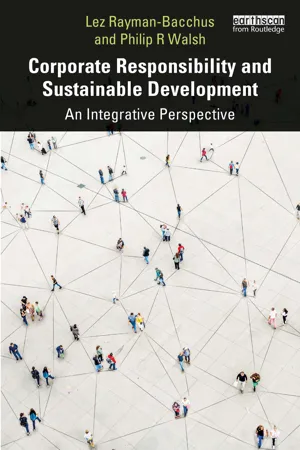
Corporate Responsibility and Sustainable Development
An Integrative Perspective
- 260 pages
- English
- ePUB (mobile friendly)
- Available on iOS & Android
Corporate Responsibility and Sustainable Development
An Integrative Perspective
About This Book
This book explores the overlapping interests of corporate responsibility and sustainable development, specifically focusing on the dynamics of social change, sustainability governance and evaluation, and creating social value.
Corporate Responsibility and Sustainable Development: An Integrative Perspective draws on ideas and research relevant to both concepts, highlighting the interdependent nature of corporate strategy and policymaker ambition. The authors seek to capture that any evaluation of responsibility for sustainable development demands multiple lenses. They propose an integrative understanding to tackling global challenges around sustainable development and focus on four themes: contextualisation; perspectives on social change; sustainability governance and evaluation; and creating social value. Overall, the book takes an evaluative approach, using these themes as lenses for engaging with global challenges, which encourages reflection and informed action.
Written by two highly experienced authors, this book integrates short case studies and chapter questions throughout the text, in order to reinforce learning and help readers reconcile ideas presented with real world issues. It will be an essential resource for tutors and advanced undergraduate and postgraduate students of business, governance and corporate governance, corporate social responsibility (CSR), sustainability and sustainable development, stakeholder theory, business ethics, and politics.
Frequently asked questions
Information
Part I Contextualisation
1 Introduction
Global challenges facing society
| Food Security — Rising populations, especially in underdeveloped countries has increased stress on agricultural processes to produce the level of food required to avoid famine. |
| Peace and Conflict — Countries around the world continue to experience conflict with each other and within themselves around matters such as border disputes and religion. |
| Income Inequality — Increasing wealth from global economic growth is becoming more inequitable with wealth concentrating among the wealthy. |
| Biodiversity — Loss of ecosystems from human activity risk is having significant impact not only on the general ecology but also on the world's economies. |
| Employment and Workplace Standards — Large numbers of people remain unemployed across the globe yet employers are finding it increasingly difficult to find skilled employees with certain jurisdictions and industries continuing to operate with substandard working conditions and low-cost refugee and child labour. |
| Climate Change — Global warming and the human activity that is contributing to it is having an impact in terms of increasing severity of drought and storm activity, resulting in significant weather-related social and economic loss. |
| Geopolitical Competition — Countries continue to have competing interests pertaining to the economy, the environment, and society in general. |
| Global Finance — Inconsistent monetary policies and mistrust of global financial systems by investors has produced inefficient systems of finance that have limited access to credit and savings for billions across the globe. |
| Internet Use — The technological transformation led by the use of the internet has allowed for a more interconnected world, both for business and personally, but how does the entire world get connected and what will be the impact on data security and personal privacy? |
| Energy — The need for energy to support economic growth and improved standards of living has encouraged lower cost, environmentally unfriendly sources of energy. |
| Gender Equality — The gap between men and women in terms of wages, health, education, and political power remains significant and is only slowly being closed even though parity is crucial for the sustainable future of society. |
| Global Trade and Investment — Increasing exports and foreign direct investment has not been met with the levels of regulatory oversight that limit unethical behaviour and environmental damage. |
| Transnational Crime — Corruption, bribery, and unethical business practices have resulted as a result of globalisation of the economy, increased numbers and heterogeneity of immigrants, and improved communications technology. |
| Healthcare — Aging populations have increased the need for a global health system that can deal with global pandemics, rising non-communicable diseases, and the costs of healthcare, particularly in underdeveloped countries. |
| Long-term Investing — Since the 2008 global economic crisis there has remained a lack of long-term investment by governments and institutions, and with the recent COVID-19 pandemic the pressures faced by governments to address shorter-term issues the combined effect has limited the prospects of longer-term economic growth. |
| Education — A lack of access to education in developing and underdeveloped countries is limiting the ability for social and environmental progress. |
The consequences for the world's limited resources of meeting these challenges
Table of contents
- Cover
- Half Title
- Title Page
- Copyright Page
- Table of Contents
- List of figures
- List of tables
- List of insight boxes
- Acknowledgements
- List of abbreviations
- Preface
- PART I Contextualisation
- PART II Perspectives on social change
- PART III The sustainability governance trinity
- PART IV Creating social and public value
- Index